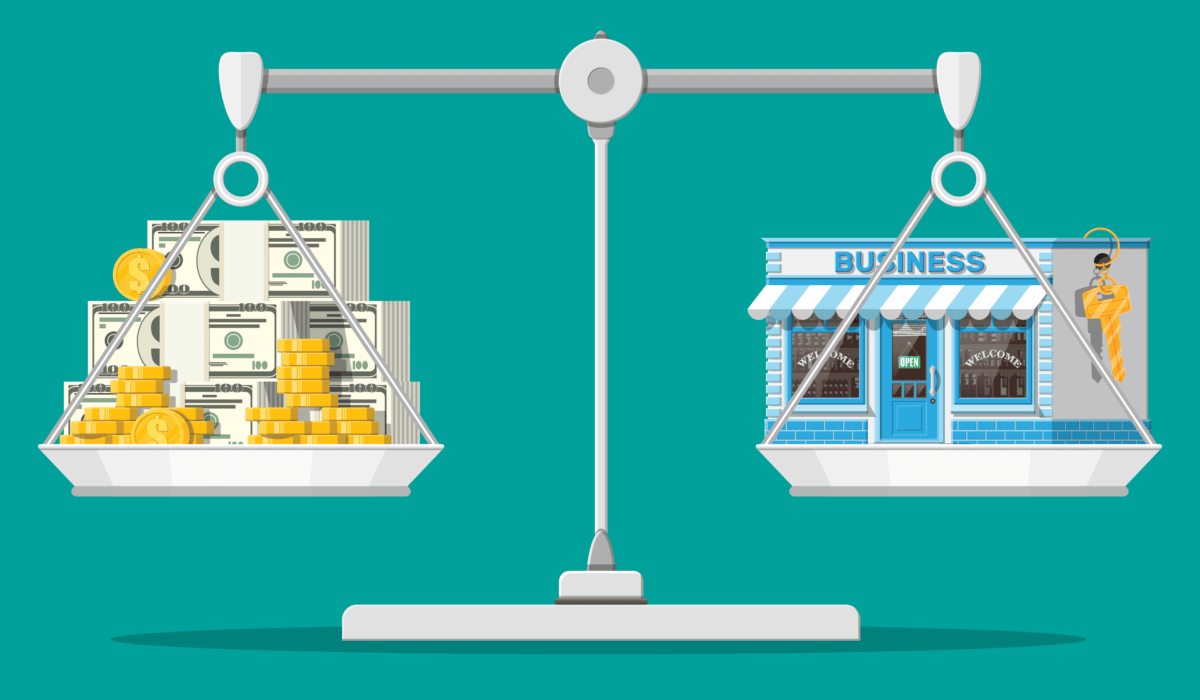If you’re a first-time seller, you may be mystified when you hear prospective buyers talk about goodwill. You can be forgiven if you’re a bit confused, as this isn’t the goodwill most people are familiar with, the sort that involves being kind to other people. Goodwill in business is something else entirely.
What is goodwill in a business sale? It’s important to know, because goodwill can have a big impact on your business’s valuation.
Goodwill may influence your buyer to pay more for your business — or to pay less. In this post, we’ll define and explain business goodwill, so you fully understand this important aspect of your business’s value.
What is goodwill in business?
To understand goodwill in business, you have to know what makes your business valuable to a buyer, said Chris O’Shell, CPA, of the financial and business advisory firm Seamless Advisors.
Unless your business is entirely digital, it has two types of valuable things. It has physical assets you can touch, such as computers, retail stores, trucks, merchandise, marketing brochures, company manuals, or real estate. Physical assets and their value will occupy one line of your balance sheet.
Every part of your business’s value that can’t be attributed to a physical asset is considered an intangible asset. That means that for many online businesses, those that are entirely digital, your business is made up entirely of intangible assets.
These business intangibles may include:
- Brand awareness
- Email lists
- Client or customer relationships
- The workforce and their knowledge of business operations
- Company reputation
- Vendor relationships
- Website traffic
- Copyrights, patents and trademarks
- Software or other digital assets
- Domain names
Many acquirers buy an existing business in large part because of the existence of these intangibles. They don’t want to have to build up a company reputation, find initial customers, and establish vendor relationships from scratch.
So they are indeed valuable, but their exact value is hard to quantify. The buyer will decide what these intangibles are worth to them.
What does goodwill mean? A definition
To sum up: Goodwill is any intangible asset that’s associated with the purchase of one business by another.
Do all businesses have goodwill? While most do, not all will. If your business is pre-revenue, recently started, or operating at a loss, there may not yet be goodwill to record on your balance sheet.
Where does goodwill go on a balance sheet?
On your business’s balance sheet, goodwill occupies its own asset line, as an entry for intangible assets and their value, explained O’Shell.
Each buyer will have their own calculation for the value of goodwill in their proposed purchase price, so it’s a line to take a close look at.
How is goodwill calculated?
To think of it mathematically, if you take the offer price and subtract the assessed value of the physical assets, the remainder is goodwill.
Here’s an example of that calculation:
$1,000,000 total business valuation
– $750,000 in tangible assets
$250,000 in goodwill
Physical assets are fairly easy to value, by researching their resale price. Intangible assets can be harder to quantify, which is one reason why different buyers’ purchase offers may vary. Each buyer will decide how valuable your intangible assets are to their particular business.
Think of selling a content site, for example. A buyer might decide it’s worth more than a typical multiple of profit or revenue because your brand is strong in the niche, or the site has lots of hard-to-attain back-links, or they might be drawn to other intangibles. They’d attribute that excess value to goodwill.
When goodwill is bad for the seller
One intangible item that can spell trouble for sellers is the value of the founder’s reputation and personal relationships. This is known as “personal goodwill,” said O’Shell.
As a seller, you want to convince the buyer that your personal goodwill is not essential to the business’s success. The more reliant the business is on your charisma or sales skills, the more skeptical buyers will be that the business will succeed without you.
They might want to tie you to an earn-out contract, to keep you working and make sure the business continues to thrive, giving the buyer time to figure out how to effectively replace you. A buyer might also value the business lower, assuming sales may drop once you’re out of the picture.
In essence, the presence of substantial personal goodwill as a key business asset has a negative impact on the business’s total value.
“You want to turn personal goodwill into commercial goodwill,” O’Shell said. Convince the buyer that your team and business systems are set to carry on well without you, and you’ll erase the stigma of personal goodwill.
How can sellers get more value for goodwill?
You can see that intangible assets are a squishy category that may be valued high or low, depending on the buyer. As a seller, you’d like to see a high value assigned to goodwill so it inflates your total payout.
How can you increase your intangibles’ value? By attracting multiple buyers.
Often, O’Shell said, when a bidding war erupts over a potential acquisition, the competing acquirers will jack up the value they assign to goodwill in an attempt to outbid each other. For instance, a business with a real-world value of $10 million suddenly is valued at $12 million by a strategic buyer that’s hot to claim this asset — and keep it out of competitors’ hands.
“You get a lump of goodwill in a bidding war,” he said.
How is goodwill taxed when selling a business?
Selling your business triggers a potentially large tax bill. To minimize your taxes, you’ll want to find out how much of your sale price will be considered goodwill before you close your deal.
As the seller, having more value attributed to goodwill is usually best, noted O’Shell. Depending on your income level, capital gains from the goodwill side of your proceeds will be taxed anywhere from 0%-20%. The payout for your physical assets will be taxed at your regular tax rate, which is usually higher. Ordinary tax rates currently range from 10%-37%.
The business’s physical assets will be assessed for depreciation recapture at tax time. What is that?
If you’ve been writing off the value of physical assets over the years, but then sell them at a profit, you’ll owe taxes for some of the depreciated amount at the ordinary rate. Calculating how much you owe is complex; just know that selling physical assets you’ve previously depreciated is going to hike your tax bill, especially if you wrote the value off completely over the years. That’s why you want to avoid having much value assigned to physical assets.
But for the buyer, it’s better to have more value attributed to physical assets. In an asset sale, buyers can depreciate physical assets faster than they can write off goodwill.
Buyers typically have 5-7 years to write off physical assets. By contrast, goodwill is amortized over 10 years for private businesses and 15 years for publicly traded companies, O’Shell noted.
To sum up: A buyer can reap tax benefits much faster on physical-asset costs, motivating the buyer to want more value attributed to physical assets.
This difference in tax benefits between buyers and sellers can lead to some negotiating tug-of-war, said O’Shell. Buyers often want to wait until after closing to decide how to attribute the sale proceeds, so they can create the most favorable tax situation for themselves. Sellers should raise the issue during negotiations to protect their interests, he said.
One key thing to know: In an asset sale, the business buyer files IRS form 8594, disclosing how much of their purchase price is attributed to physical assets and how much is goodwill. The seller must then obtain and use this same statement for their taxes, as the two tax filings must agree on the sale terms.
The best tax situation for sellers when it comes to goodwill
Wondering if there’s a way to get all your sale proceeds attributed to goodwill? There is! If your business has no physical assets, the entire price is considered goodwill.
One other approach for businesses with physical assets: Avoid an asset sale and structure your deal as a stock sale. This requires thinking ahead, but it might help you pay fewer taxes.
Unless you can restructure your deal as a stock sale, getting as much value as possible attributed to goodwill is a seller’s best outcome. As a seller, be looking for ways to portray your intangibles as highly valuable, and you’ll be able to command the best price — and pay fewer taxes — when you sell your business.
We’re reporters, not lawyers. If you need help with a legal matter, please hire a lawyer. The information contained in this piece is provided for informational purposes only, and should not be construed as legal advice.



